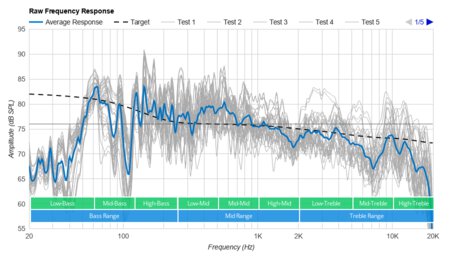The Google Home Max is a small speaker that has built-in Google Assistant capabilities. It's voice-activated, and it can pick up your voice even if you aren't very close to the speaker. You can also mute the microphone when you don't want it to hear you. Its balanced mid-range makes it suitable for vocal-centric content like podcasts, but it's lacking a bit of low-bass, which can be disappointing for some music fans. On the upside, there are bass and treble adjustments available in its companion app.
Our Verdict
The Google Home Max is fair for music. Its balanced mid-range can reproduce vocals and lead instruments clearly, but its underemphasized treble can make audio dull. Also, it's lacking low-bass, which is disappointing for fans of bass-heavy music genres like EDM. It gets loud, but there's a bit of compression at max volume. Fortunately, you can adjust its bass and treble levels.
- Bass and treble adjustments.
- Lacks low-bass.
The Google Home Max is adequate for videos and movies. Its balanced mid-range can reproduce dialogue clearly, but it lacks low-bass, so you don't feel the deep thump in action-packed scenes. Also, it has a mediocre soundstage, and there's compression when you play it at max volume. Its latency with Android and iOS devices may be too high for watching videos, but fortunately, it performs better over a Google Chromecast connection.
- Bass and treble adjustments.
- Low latency over Google Chromecast.
- Mediocre soundstage.
- Lacks low-bass.
The Google Home Max is okay for podcasts. It has a balanced mid-range that can reproduce voices clearly and accurately. You can also stream podcasts from your phone or tablet to the bar wirelessly over Wi-Fi, and it supports multi-device pairing. Unfortunately, this speaker isn't very portable, and it has a mediocre soundstage.
- Multi-device pairing.
- Mediocre soundstage.
The Google Home Max is great for voice assistant. It has built-in Google Assistant, and the speaker can hear you even if you're far away. You can also mute the microphone if you don't want the speaker to listen to you. Unfortunately, it's soundstage isn't perceived as very large or directional.
- Excellent far-field performance.
- Built-in Google Assistant.
- Mediocre soundstage.
The Google Home Max needs to be plugged into a wall outlet to work, so it isn't suitable for outdoor use.
Check Price
Differences Between Sizes And Variants
This speaker is available in both 'Charcoal' and 'Chalk'. While we tested the 'Charcoal' variant of this speaker, we expect our review to also be valid for the 'Chalk' color as well.
If you come across another variant of this speaker, let us know in the discussions.
Popular Speaker Comparisons
The Google Home Max is a compact speaker with built-in Google Assistant capabilities. You can only use it when it's plugged into an outlet, so it isn't suitable for outdoor use. However, it's voice-activated, and it can pick up your voice even if you're far away from the speaker.
The Google Home Max and the Google Nest Audio are similar speakers, but the Home Max has a more versatile performance. The Home Max's sound profile is better-balanced, and it can get louder. Also, it has lower latency over a Wi-Fi connection, so it's a better choice for watching videos and supports multi-device pairing. That said, both speakers are great for voice assistant support.
The Google Home Max is a better speaker than the Sonos One Gen 2/One SL. The Google has a slightly more extended low bass, and it can get louder with fewer compression artifacts. It also supports Bluetooth, and its built-in voice assistant can better register your commands in noisy environments.
The Google Home Max and the Sonos Five are two mid-size speakers with different strengths and depending on your needs, you may prefer one over the other. The Google has better controls and has an excellent-performing Google Assistant built-in. It also supports Bluetooth, Wi-Fi, and Google Chromecast. However, the Sonos can produce more low-bass and has a better-balanced sound profile, which makes it better suited for music. It also supports Apple AirPlay.
The Google Home Max and the Google Nest Mini (2nd Gen) both offer impressive performances for voice assistant, but the Home Max is a better choice for music and videos. Out-of-the-box, the Home Max has a better-balanced sound profile, and it can get louder. Also, it has lower latency over a Chromecast connection.
Test Results


The Google Home Max has a fairly discreet style and should fit well into most decor. However, some might find it a bit bulky, and due to its non-cylindrical design, some might prefer putting it against a wall. You can also position it vertically, but this turns the sound into mono.
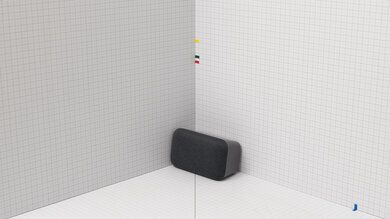
This speaker is bulky and isn't designed to be very portable. It's powered only by AC, so it needs to be plugged in a wall outlet for it to work.

The build quality is mediocre. The frame is entirely made of plastic, and there's fabric covering the speaker, which is subject to tearing and can collect dust easily.
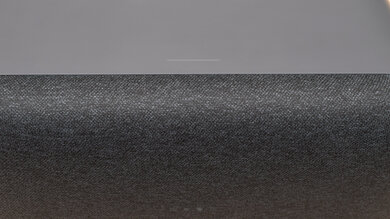
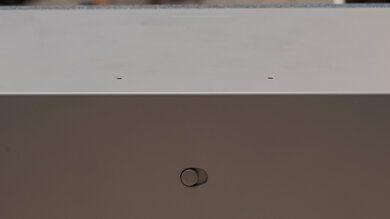
The control scheme is great. You have a small tactile line at the top of the speaker that allows you to control volume and play/pause your audio content easily. You can also turn off the microphone with a physical switch located at the back of the speaker. Unfortunately, you can't skip forward or backward with the speaker's control scheme, but this shouldn't matter too much as you can still do so with voice commands.
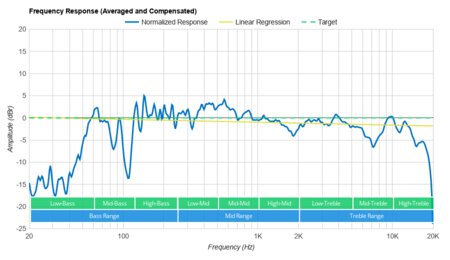
The Google Home Max's frequency response accuracy is decent. The overall sound profile is well-balanced, although it struggles with low-bass, which can result in a lack of thump and rumble. Unfortunately, it also lacks a bit of detail in the upper treble, which might make it sound a bit dark. It's still well-balanced overall, especially in the mid-range, which is great for vocals and dialogue. We used the Smart Sound feature that auto-calibrates the speaker to the room it's in.
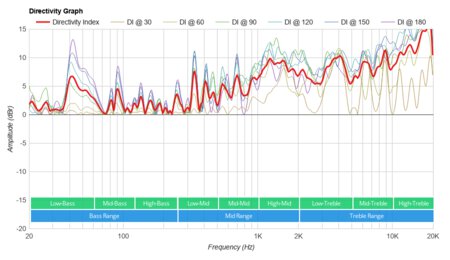
The soundstage is mediocre. While it's a stereo sound when placed horizontally, the directivity is quite poor, resulting in a soundstage that feels a bit more closed-off. The speaker automatically becomes mono whenever placed vertically, but we don't test for this. For a smart speaker with a better soundstage, check out the Bose Home Speaker 500.
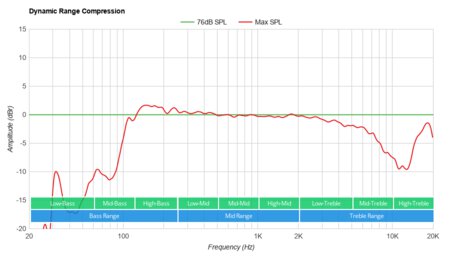
The Google Home Max's dynamic performance is fair. It can get quite loud, which is great if you're using it in a crowded or large environment. However, there are some compression artifacts in both the bass and treble ranges at max volume, so pushing it to its limits isn't recommended.
This speaker doesn't have a battery and only works if it's plugged into a wall socket.
The Google Home Max has excellent voice assistant support. Like the Google Nest Audio, it has built-in Google Assistant and performs very well, even if you're far from the speaker. You can easily control your audio content with your voice, and if you don't like knowing that the speaker is always listening to you, you can mute the microphone with the switch at the back.
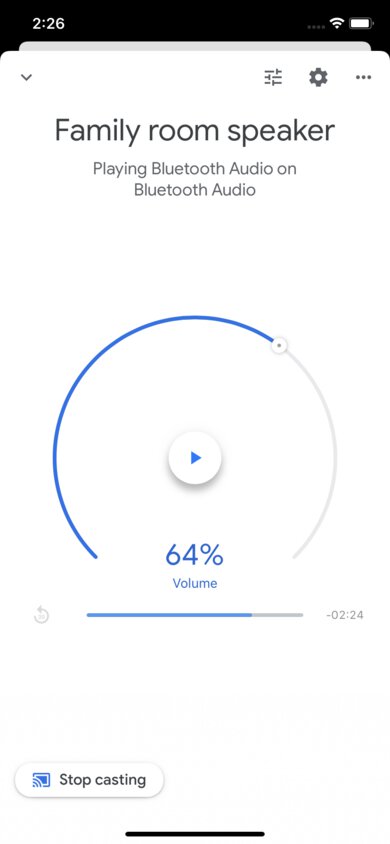
The Google Home app is remarkable. You can adjust the speaker's bass and treble levels as well as control and configure multiple Google speakers to suit your preferences. You can use two Home Max speakers together to create a larger stereo setup, or set them up in different rooms and cast to them simultaneously via Wi-Fi. If you're looking for a speaker with a Graphic EQ and presets, check out the Sony SRS-RA3000.
This speaker has an Aux port for you to plug in your devices and easily switch between them. There's also a USB-C port, but the manufacturer doesn't mention what it can be used for.
The Google Home Max speaker is Bluetooth-compatible and can be connected to two devices at the same time. Its wireless range is quite good as well. Unfortunately, its Bluetooth latency is a bit too high to listen to videos, although some apps may compensate for this, so your experience may vary.
The Google Home Max is Wi-Fi compatible and allows for Google Chromecast with very low latency, which is good. However, if you're looking for a wired speaker that supports Apple AirPlay, consider the Sonos Five or the Sonos One Gen 2/One SL.


